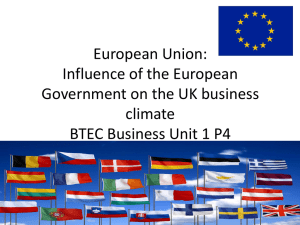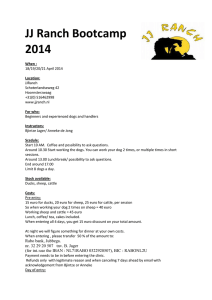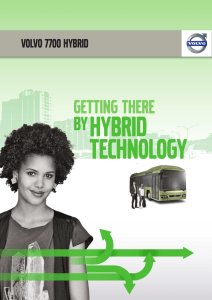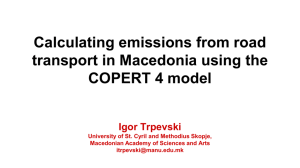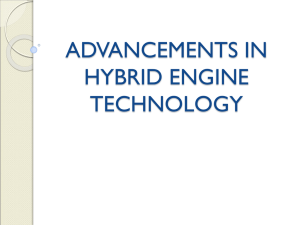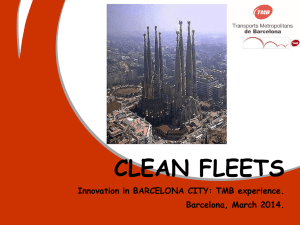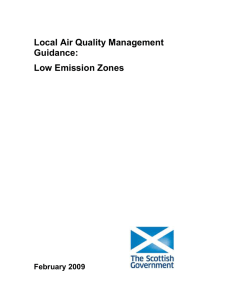Click here to - Low Emission Strategies
advertisement
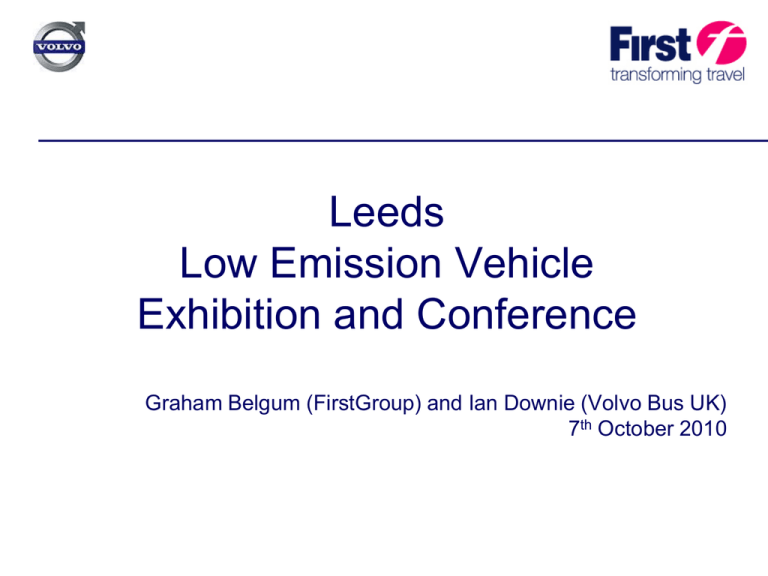
Leeds Low Emission Vehicle Exhibition and Conference Graham Belgum (FirstGroup) and Ian Downie (Volvo Bus UK) 7th October 2010 Reducing Emissions (Standards) Tier Euro 1 Euro 2 Euro 3 Euro 4 Euro 5 Euro 6 Date July 1992 January 1996 January 2000 January 2005 September 2009 January 2014 CO 2.72 1.0 0.64 0.50 0.50 0.50 NOx 0.50 0.25 0.18 0.08 HC+NOx 0.97 0.7 0.56 0.30 0.23 0.17 PM 0.14 0.08 0.05 0.025 0.005 0.005 • Table shows the standards compared to the previous ones (in g/km). • You can see clearly which emissions were the focus for each new standard Reducing Emissions (Actions) • Purchased a large number of Euro 4 vehicles over the last 4 years. • Currently purchasing Euro 5 and Euro 5 EEV vehicles. • Scrapping pre-Euro, Euro 1 and Euro 2 vehicles. • Replacing some Euro 3 engines with Euro 4 engines and are looking to do more. • Using after treatment technologies to bring Euro 3 emissions up to Euro 4 standards. • These actions are significantly reducing the amount of NOX and particulates we emit. Reducing Emissions (Producing less CO2) • Bio-Diesel Whole fleet runs on 7% bio-diesel. Have a 25% and 100% bio-diesel project. • We have implemented a safe and efficient driving programme using: A managed service provided by GreenRoad Technologies Ltd The Smith System defensive driver training program. • Improved vehicle maintenance: Ensure correct tyre pressures and wheel alignment Addressing any vehicle which has an excessive fuel usage compared to the average. • Minimising the time vehicles spend idling: We are currently rolling out a capability to identify where, when and who is excessively idling their vehicles. This is backed up with a switch off when not required campaign. Embracing new technology • More Efficient Diesel Vehicles Reducing vehicle weight. Using electric fans, steering and doors. • Hybrids: Currently trialling 5 x Wrightbus series hybrids in London. Have just trialled 1 x Volvo/Wrightbus parallel hybrid in Leeds and have placed an order for 6. Looking to purchase a further 30 with the help of the Green Bus fund. Will shortly be operating 12 Optare Versa and 8 Optare Solo series hybrids in Manchester. • Retrofit Hybrids: Are working with suppliers to trial kinetic and electrical energy recovery systems by storing energy wasted during braking and releasing it during acceleration. Embracing new technology – A61, Leeds • Green Bus Fund: Bid to implement parallel hybrid vehicles on Scott Hall Guideway • Three phase implementation – Volvo/Wrightbus B5TL : Single vehicle trial for 8 Weeks (Jul-Aug 10) Pilot 6 vehicles (Delivery early 2011) Additional 16 vehicles (Delivery early 2012) subject to successful early phases • Corridor Package: Discussions ongoing with Leeds City Council and Metro to provide a complementary package of infrastructure, bus priority and marketing measures to maximise benefits from significant vehicle investment Volvo Hybrid Volvo Group hybrid development Many years’ experience Diesel electric parallel Cumulo System Turbine electric series Diesel hydraulic Diesel electric parallel Advanced engineering 1985 series production 1995 2005 2010 Waste not, want not: recycling in action….. Roll, brake To convert waste energy into useful power and therefore save fuel 8% Roll, acc 11% Drag, brake 3% Drag, acc 2% Braking 76% Rolling losses Aerodynamic losses Brake losses – converted to electric power to drive the vehicle Parallel Electric Hybrid Drive to the rear axle comes from the engine and electric motor in combination 0 – 100% from each power source Engine, Electric Motor and Generator can be downsized Volvo Integrated Starter Alternator Motor is a combined electric motor and generator Diesel engine Combined Enhanced Torque performance diagram Electric Motor and Diesel Engine The parallel hybrid combines the output of the diesel engine and the electric motor for enhanced performance at the optimum point of operation Torque Key Diesel Engine Electric Motor Combined rpm Volvo Bus: January 2010 11 Two Fuel Saving Opportunities in the Hybrid Hybrid Vehicle Propulsion Provides power & torque assistance Recover brake energy Zero emission / silent mode Non idling functionality (at bus stops for example) Engine downsizing Alternative drive of auxiliaries Electric Motors to drive: hydraulic pumps, air compressor and a/c drive Easier to control Only driven when needed Driven at optimal working points independent of engine speed Minimum idling losses Why “Hybrid”? • 2 Main Benefits Environment • 30% reduction in Carbon Dioxide • Up to 50% reduction in Air Quality Pollutants (NOx, PM) • Noise Reduction (silent takeoff) Economy/Finance • 30% Fuel Saving plus lower maintenance • Payback for Higher Initial Price in 6-7 years

